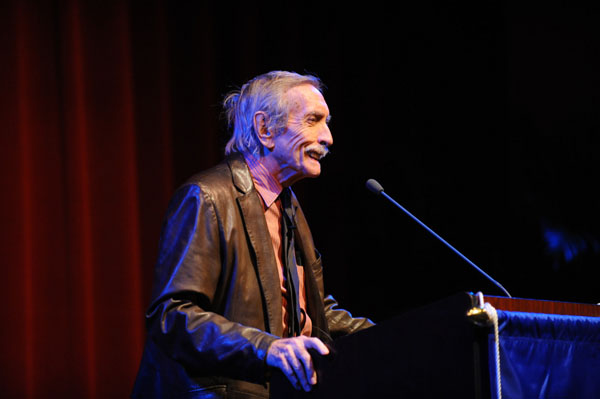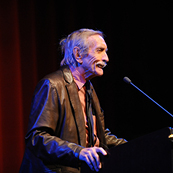
More than 400 NSU students, faculty, and guests braved stormy South Florida weather to spend an evening with Pulitzer Prize-winning playwright Edward Albee, who spoke at NSU on Apr. 4. Part of NSU’s Farquhar College of Arts and Sciences Distinguished Speakers Series, the event was hosted by the college’s Division of Performing and Visual Arts.
Albee provided a personal account of his 85-year-long life, beginning with his struggles as an adopted child who never knew his biological parents.
“I had a rather hard time finding my identity,” Albee told the audience. “I never had a name. I’ve never been allowed to know the name of my natural parents.”
Although he rarely got along with his adoptive parents—wealthy heirs to a vaudeville family legacy—Albee said he’s grateful for the “splendid education” they provided for him. That education included several private schools, as Albee explained that he dropped out multiple times while searching for his identity.
He finally found himself in writing, penning his first poem at age eight. Albee said he went on to compose “the two worst novels ever written by an American teenager.” Despite his own distaste for the early work, Albee said he refused to give up writing.
So, how did the hopeful poet turned failed novelist discover the stage? “I had no choice,” Albee said, drawing laughs from the crowd. “I became a playwright because I had failed in every other branch of writing, and I had determined that I was a writer.”
Fast-forward five decades and Albee’s storied life as a playwright has “gone pretty well,” as he said. His perhaps most famous play, the 1962 drama Who’s Afraid of Virginia Woolf? won both the Tony and New York Drama Critics Circle awards. Albee also earned three Pulitzer Prizes: for A Delicate Balance in 1967, Seascape in 1975, and Three Tall Women in 1994.
Even today, Albee isn’t about to close the curtains on his career. He revealed that six months ago, he underwent successful open-heart surgery, which doctors claimed could extend his life for at least another decade. Albee said he’s working on his 32nd play and has more in his head that he plans to write.
“I don’t think I’ll ever stop writing,” he said. “I don’t plan to die. I can’t imagine being dead. It’s such a boring concept. Look at how much I’d miss.”
After his keynote, Albee answered questions from students and audience members, discussing topics such as theatre critics, the power of writing, and the impact plays should have on society. The talk concluded with a book signing and a meet and greet. Prior to the evening’s events, Albee met with undergraduate students from NSU’s Farquhar College of Arts and Sciences in a special seminar.

